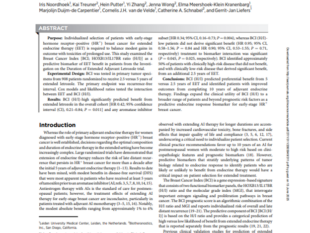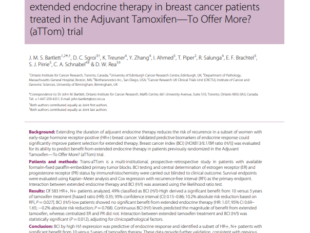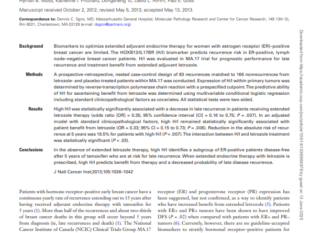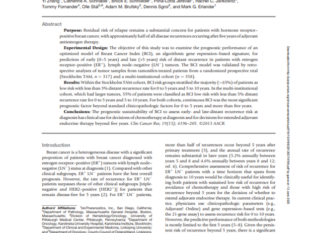Validation Studies
Breast Cancer Index (BCI) and prediction of benefit from extended aromatase inhibitor (AI) therapy... Show more
Breast Cancer Index (BCI) and prediction of benefit from extended aromatase inhibitor (AI) therapy (tx) in HR+ breast cancer: NRG oncology/NSABP B-42
The BCI HOXB13/IL17BR ratio (BCI-H/I) has been shown to predict endocrine tx (ET) and extended ET (EET) benefit. This study examined the effect of BCI-H/I for EET benefit prediction in NSABP B-42, evaluating extended letrozole tx (ELT) in HR+ breast cancer patients (pts) who completed 5 yrs of ET.1
Available free online from Journal of Clinical Oncology.
1.Mamounas EP et al. J Clin Oncol. 2021;39(suppl 15):501.

Breast Cancer Index Predicts Extended Endocrine Benefit to Individualize Selection of Patients with... Show more
Breast Cancer Index Predicts Extended Endocrine Benefit to Individualize Selection of Patients with HR+ Early-stage Breast Cancer for 10 Years of Endocrine Therapy
Individualized selection of patients with early-stage hormone receptor–positive (HR+) breast cancer for extended endocrine therapy (EET) is required to balance modest gains in outcome with toxicities of prolonged use. This study examined the Breast Cancer Index [BCI; HOXB13/IL17BR ratio (H/I)] as a predictive biomarker of EET benefit in patients from the Investigation on the Duration of Extended Adjuvant Letrozole trial.1
Available free online from Clinical Cancer Research, an AACR publication.
1. Noordhoek I et al. Clin Cancer Res. 2021;27(1):311-319.

Breast Cancer Index and prediction of benefit from extended endocrine therapy in breast cancer... Show more
Breast Cancer Index and prediction of benefit from extended endocrine therapy in breast cancer patients treated in the Adjuvant Tamoxifen—To Offer More? (aTTom) trial
Extending the duration of adjuvant endocrine therapy reduces the risk of recurrence in a subset of women with early-stage hormone receptor-positive (HR+) breast cancer. Validated predictive biomarkers of endocrine response could significantly improve patient selection for extended therapy. Breast cancer index (BCI) [HOXB13/IL17BR ratio (H/I)] was evaluated for its ability to predict benefit from extended endocrine therapy in patients previously randomized in the Adjuvant Tamoxifen—To Offer More? (aTTom) trial.1
Available free from Annals of Oncology, an ESMO journal.
1. Bartlett JMS et al. Ann. Oncol. 2019;30(11):1776-1783.

Prediction of Late Disease Recurrence and Extended Adjuvant Letrozole Benefit by the HOXB13/IL17BR... Show more
Prediction of Late Disease Recurrence and Extended Adjuvant Letrozole Benefit by the HOXB13/IL17BR Biomarker
Biomarkers to optimize extended adjuvant endocrine therapy for women with estrogen receptor (ER)–positive breast cancer are limited. The HOXB13/IL17BR (H/I) biomarker predicts recurrence risk in ER-positive, lymph node–negative breast cancer patients. H/I was evaluated in MA.17 trial for prognostic performance for late recurrence and treatment benefit from extended adjuvant letrozole.1
Available free from Journal of the National Cancer Institute.
1.Sgroi DC et al. J Natl Cancer Inst. 2013; 105(14):1036-1042.

Breast Cancer Index Identifies Early-Stage Estrogen Receptor–Positive Breast Cancer Patients at... Show more
Breast Cancer Index Identifies Early-Stage Estrogen Receptor–Positive Breast Cancer Patients at Risk for Early- and Late-Distant Recurrence
In this study, a linear model of Breast Cancer Index (BCI), an algorithmic gene expression–based signature was evaluated for its ability to predict both early (0–5 years) and late risk of distant recurrence in estrogen receptor–positive (ER+) lymph node–negative (LN−) breast cancer.1
Available free from Clinical Cancer Research, an AACR publication.
1. Zhang Y et al. Clin Cancer Res. 2013;19(15):4196-4205.